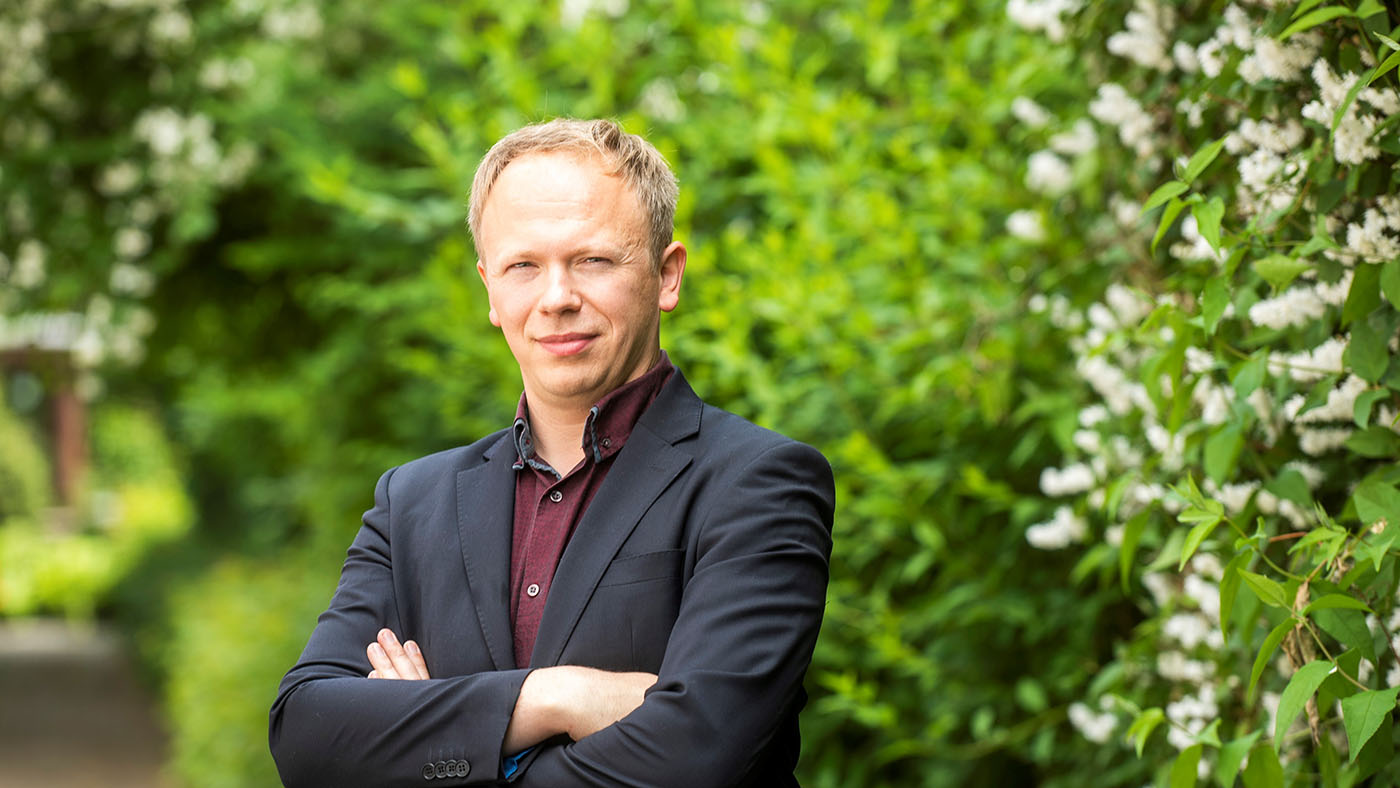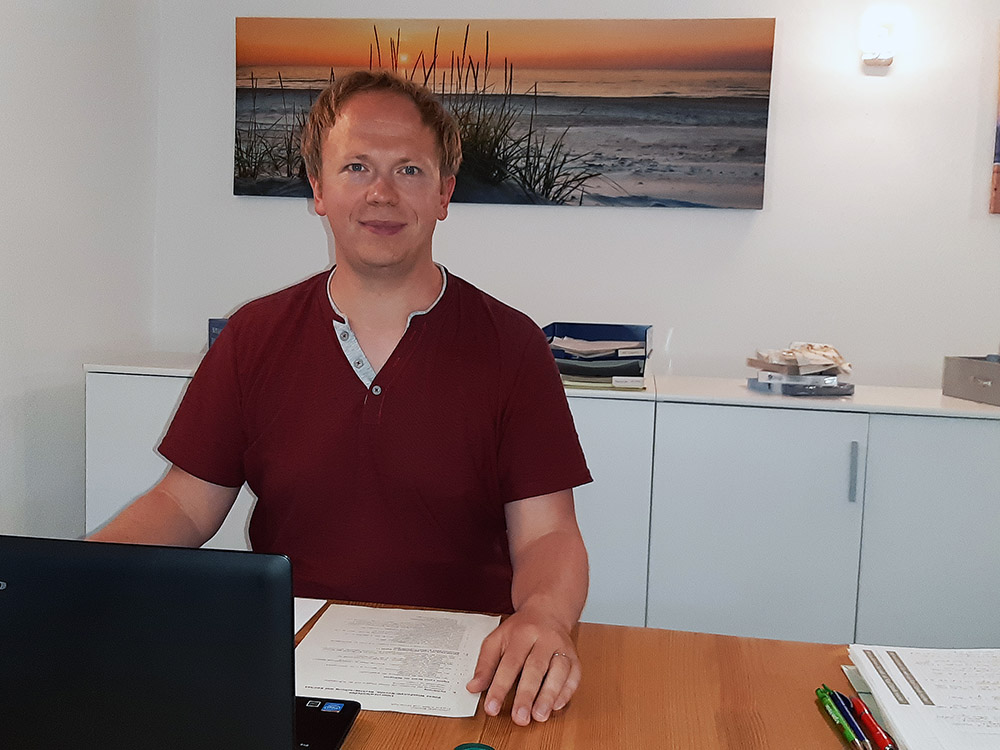
© Christina Kuhaupt
Social Report Instead of Weather Forecast
The academic mid-level sector in focus: René Böhme from the Institute for Labour and the Economy.
Today, he is a sought-after expert on social matters - but the social scientist René Böhme had not always planned on this path. He initially worked in an entirely different field and subsequently worked practically in the social sector. Finally, his interest in social policy reigned. He is now a scientific assistant at the Institute for Labour and the Economy (iaw).
“René, what’s the weather going to be like?” René Böhme’s colleagues often ask him the same thing. It’s simple - the man’s a meteorologist. “It was seriously an option when I asked myself where my career journey should take me after my civilian service,” laughs the kind scientist. But then meteorology “only” turned into a hobby - a hobby with a private weather station and computer connection. Böhme turned another of his interests into his job: his interest in social sciences.
Close to Urgent Matters
“Thank goodness for that!” is something that many people - not only those at the Institute for Labour and the Economy at the University of Bremen and Bremen Chamber of Labour - will say. After all, René Böhme is one of Germany’s most sought-after experts on topics such as poverty and social divides, the cleft between rich and poor, social inequality, the integration of refugees in the job market, the working conditions of academic staff at German universities, or childcare at atypical times. Projects, publications, talks, classes, transfer: The native of Sachsen is very close to the topics that are of burning importance to society.
It was a long path to get to the position he is in today - it wasn’t always sure, it was influenced by different factors when finding the “right way,” and included many temporary jobs and experiences in different areas. Thus, not your “typical scientific assistant career.” For a long time it wasn’t even a given that René Böhme would choose an academic career.
After completing his high school qualification in the core subjects mathematics and history at the Werner-von-Siemens Gymnasium high school in Großenhain, Böhme went on to do civilian service and then studied meteorology at Leipzig University. He also very quickly realized that it wasn’t the right thing for him. “Large, anonymous classes where the lecturers held monologues and ‘filtered out’ the students with hard exam questions - that’s not how I imagined my studies to be. In some phases, the classes solely revolved around proving some abstract formulas.”
End of Meteorology Degree - Start of Marriage
So what next? Reorientation. It took quite a while but the short period studying meteorology did have some good aspects: René Böhme met his future wife. “She stopped her studies as well and we both switched to Leipzig University of Applied Sciences. My wife trained to become an engineer and I - with positive memories of my civilian service - decided to study social work.”
Böhme found the social policy classes particularly interesting. “One of the tasks was to develop and defend our own social policy theories. That’s when I realized that I was captivated.” Minimum wage, combined wage, basic income - those are only a few of the matters that he worked on more intensely. “After I graduated with a diploma, which is comparable to today’s bachelor’s degree, I started the master’s degree in social policy at the University of Bremen in 2010.” He received a scholarship from the Protestant Academic Foundation.
“The University of Bremen was the only uni with a master’s in social policy back then.”
So, off to Bremen he went! “The university had the unique feature at the time that it was the only university offering a master’s in social policy.” The path to iaw was then a short one: As early as during his degree, he worked as a student assistant and later as a scientific assistant. “My colleague Rolf Prigge was looking for a scientific assistant for the “Armutsbekämpfung im Großstadtvergleich” project back then. He sort of stumbled across me at the social authority - where I was completing an internship - as I was working on the same topic there.” His career as a scientific assistant began.
Temporary, Part-Time Roles at the Start
However, the beginning is often difficult in the academic mid-level sector. For René Böhme, this meant that he initially had part-time roles that usually ended after one and a half years, often less, at the iaw. His wife also found a job in Bremen region and that’s when the couple decided to stay in Bremen. In the aforementioned project, which focused on poverty comparisons, René Böhme soon found out how demanding and challenging the work can be at times: “The Mayor of Dortmund once asked that I present our findings related to Dortmund to 300 people in the City Hall. My heart did start to beat a little quicker,” he says and grins.
Such talks are now part of day-to-day life for the 37-year-old. Poverty, social inequality, family-related topics - they interest René Böhme. Especially as there is a connection to his practical, social pedagogy work that he did prior to entering academia. “I am able to combine that well at the iaw. My topics often focus specifically on the framework conditions of social work - it’s an area in which I feel very comfortable. Sometimes I am able to choose the topics and sometimes they’re determined by the funding parties.”

© René Böhme
If you have expert knowledge on certain topics, much like he does, you regularly receive requests for analyses. That is how it came about that Böhme and the iaw produced the sixth Poverty and Wealth Report for Rhineland-Pfalz. They competed against two other institutes for the contract. “That shows that we are being taken seriously with our expertise in South Germany now.” Another contract that he recently received involves accompanying 60 childcare facilities in Bremen in their further development into child and family centers.
Many Connected Scientific Papers for Cumulative Dissertation
Such projects stack up in René Böhme’s CV. They’re also listed on his page on the iaw website. René Böhme now wants to use many of his papers and publications for a so-called cumulative dissertation. By doing this he will acquire the doctoral title by means of several thematically related papers and not only one research project. “I actually wanted to get going with it in 2020 but then the pandemic happened and changed all my plans.” As family Böhme was not granted emergency childcare for their two children, he had no headspace: “Both of us working from home with the kids - it’s just not possible to work on a dissertation in a concentrated way like that.”
“Both of us working from home with the kids - it’s just not possible to work on a dissertation in a concentrated way like that.”
René Böhme now has a permanent job at the iaw - the research center is a cooperation between the university and the Chamber of Labour. “I am very happy. It’s a great job. I not only enjoy research but also transfer.” He holds many talks, teaches in the social work degree course at Bremen City University of Applied Sciences each summer semester, teaches classes at schools, and much more. His knowledge is in high demand. And it’s safe to say that he does in fact find a social report far more interesting that a weather report nowadays.